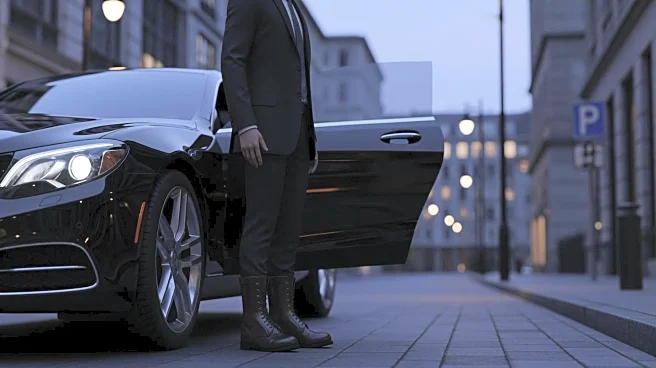What's Happening?
Angelina Jolie's visit to Ukraine has led to unexpected consequences as her bodyguard driver, Dmytro Pyschchikov, was seized by military recruiters. Jolie, known for her humanitarian efforts, was touring war-torn areas such as Kherson and Mykolaiv to meet
volunteers and medics. During the visit, Pyschchikov was taken to a local enlistment center after failing to produce proper military registration documents. Despite his claims of exemption due to a back ailment, officials deemed him fit for non-combat roles. Jolie's visit, intended to highlight humanitarian issues, faced criticism on social media, with some suggesting it inadvertently exposed military positions and led to Pyschchikov's conscription.
Why It's Important?
The incident underscores the complexities and potential pitfalls of celebrity involvement in international humanitarian efforts. While Jolie's visit aimed to draw attention to the plight of Ukrainians, it inadvertently led to the conscription of her bodyguard, raising questions about the impact of such high-profile visits. This situation highlights the delicate balance between advocacy and unintended consequences, as well as the scrutiny celebrities face when engaging in global issues. The event may influence how public figures approach humanitarian missions, considering the potential for unforeseen outcomes.
What's Next?
Following the incident, there may be increased caution among celebrities and public figures when planning visits to conflict zones. Jolie's experience could prompt discussions on the best practices for humanitarian advocacy, ensuring that efforts do not inadvertently compromise local security or individuals' safety. Additionally, the Ukrainian military's handling of the situation might lead to further scrutiny and potential diplomatic discussions, especially if Jolie's involvement continues to attract media attention.
Beyond the Headlines
The broader implications of this event touch on the ethical considerations of celebrity activism. Jolie's visit, while well-intentioned, raises questions about the role of celebrities in international affairs and the potential for their actions to have unintended negative impacts. This incident may spark debate on the responsibilities of public figures in advocating for global issues and the need for careful planning and coordination with local authorities to avoid adverse outcomes.

















